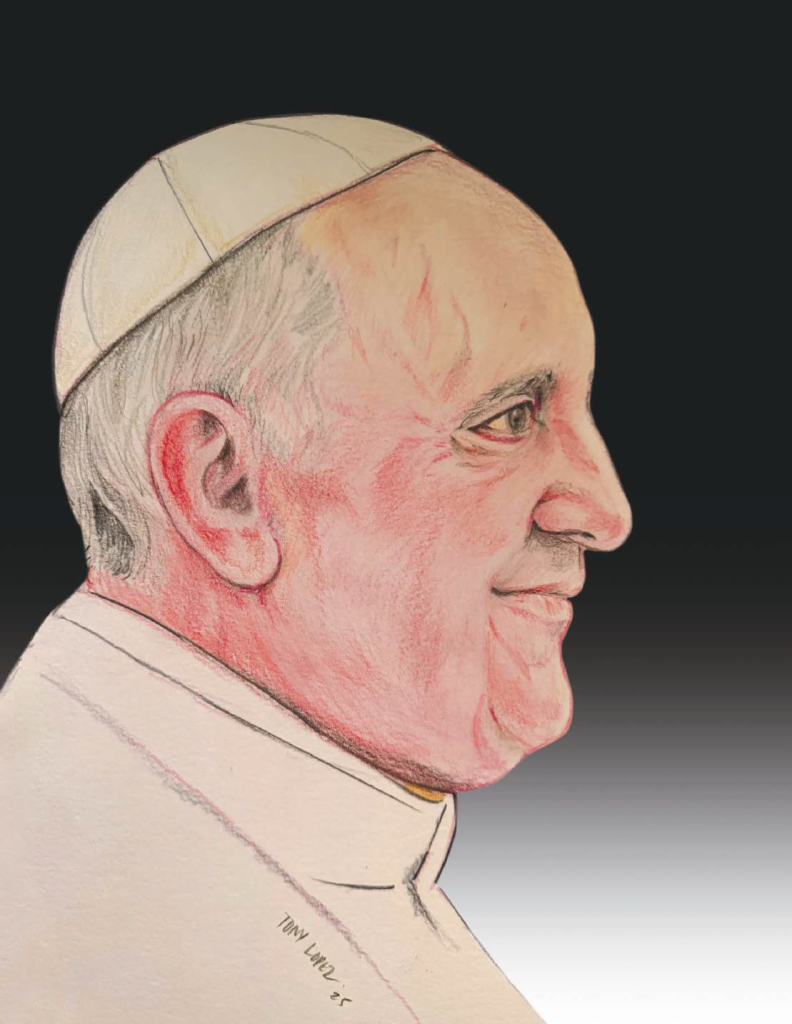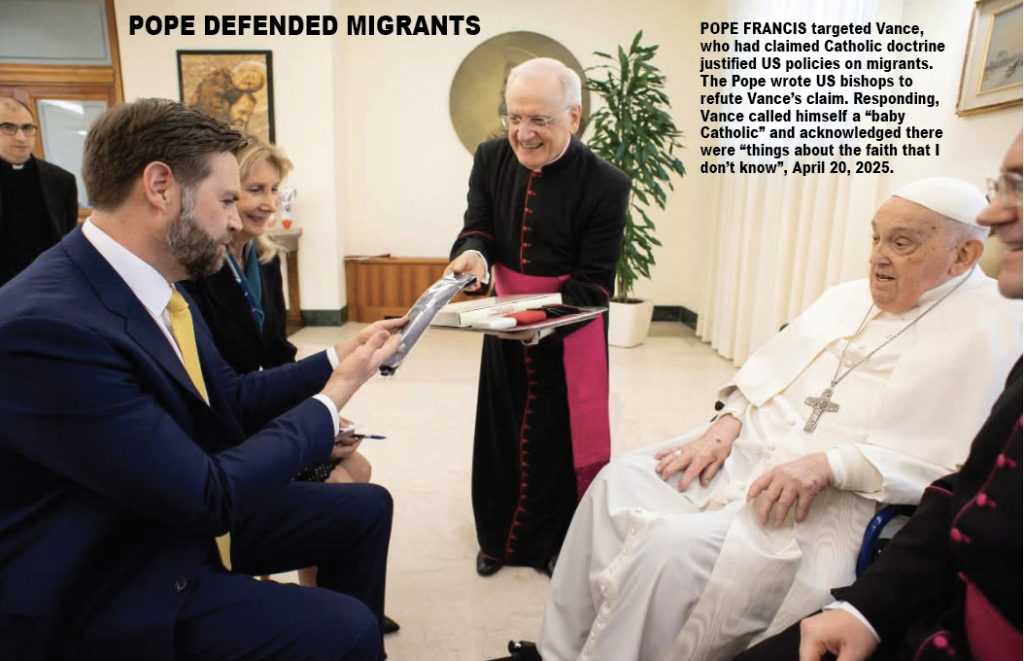Pope Francis’s reign became remarkable for his humility, for promoting a more merciful, less rigid Church, a smiling, relevant Church, with a singular focus on ministering to the poor, the suffering, the imprisoned, the dispossessed and the marginalized, those who often, are invisible to society.

By TONY LOPEZ
Easter Sunday, the day before he died, Pope Francis, 88, had a blitzkrieg meeting with JD Vance, 40, at the reception room of the Vatican hotel where the pontiff lived. He offered the US vice president three big chocolate Easter eggs for Vance’s three young children, who did not attend, as well as a Vatican tie and rosaries.
“I know you have not been feeling great, but it’s good to see you in better health,” Vance told the Pope. “Thank you for seeing me.”
The Pope and Vance had disagreed very publicly over the Trump administration’s attitude to immigration and its migrant deportation plans. Trump wants to deport up to two million unwanted immigrants. In February, Francis warned that the MAGA administration’s mass deportation and cracking down on immigration were driving a “major crisis” that “damages the dignity of men and women”. US is home to 85 million Catholics.

Why Pope wanted to see Vance
In particular, Francis targeted Vance who had claimed Catholic doctrine justified such policies. The Pope wrote US bishops to refute Vance’s claim. Responding, Vance called himself a “baby Catholic” and acknowledged there were “things about the faith that I don’t know”.
Unspoken, the Pope’s message to Vance in their April 20 meeting was clear as a beautiful Easter Sunday: Please go slow on migrants.
By 7:35 a.m. Easter Monday, April 21, 2025, Francis died, of a stroke followed by a coma and a heart failure. “His entire life was dedicated to the service of the Lord of His Church. He taught us to live the values of the Gospel with fidelity, courage, and universal love, especially in favor of the poorest and most marginalized,” said the Vatican, announcing his passing.
A great reign
Thus, ends one of the greatest papal reigns in the Catholic Church’s 2,000-year history. Christianity is one of the greatest religions. Half of Christians are Catholics, who number 1.4 billion, 17% of the world’s population.
This century, the Church has suffered from an unprecedented crisis of faith among the faithful and a loss of relevance to their daily lives.
In March, a Pew Research Center survey found only 19% of Americans self-identify as Catholic, down from 24% in 2007, a 20% decrease. Protestants decreased by 21%, while religious “nones” increased by 81% and Muslims increased by an astounding 200% (although they still make up a small percentage of the US population—only 1.2%).
Philippines 79% Catholic
In 1960s, the Philippines was 87% Catholic. That ratio is down to 78.81%, as of February 2023. Today, in the world, there are more Muslims, two billion, than Catholics, 1.4 billion. Islam is the fastest-growing religion.
Enter Cardinal Jorge Mario Bergoglio on March 13, 2013. He became Pope Francis, the 266th pope, after the surprise resignation on Feb. 28, 2013 of Pope Benedict XVI (Joseph Alois Ratzinger), ending an eight-year papacy.
Bergoglio was a pope of many firsts—the first Argentinian, the first Jesuit, the first from the Americas, the first from the Global South, the first to adopt the name Francis, the patron saint of gardening; and the first non-European head of the Roman Catholic Church in 1,300 years.
Pope Francis’s reign became remarkable for his humility, for promoting a more merciful, less rigid Church, a smiling, relevant Church, with a singular focus on ministering to the poor, the suffering, the imprisoned, the dispossessed and the marginalized, those who often, are invisible to society.
“Hope does not disappoint,” he preached. He was the Pope of inclusion. “My brother Cardinals have gone to the ends of the earth to get one, but here we are,” he told his crowd at the balcony of the Vatican upon his election.
In seeking reforms in Catholicism and promoting inclusion, Francis imagined a Church as “a field hospital concerned more with those who suffer than defending its own interests”.
He did house cleaning in a detached Church accused of sexual abuse of minors and financial scandals by prelates. He likened the task to “cleaning the Sphinx of Egypt with a toothpick”.
Gay people
Asked on his attitude towards gay people, Francis replied: “Who am I to judge?” “Homosexuality is not a crime,” he said, and called “unjust” laws that criminalize homosexuality or homosexual activity.
He made distinctions between a sin and a crime. He urged church members, including bishops, to show “tenderness” as God does with each of his children.
Francis allowed priests to bless unmarried couples and give communion to remarried people and divorcees. Women were given greater roles in the ministry but were still not allowed to become priests.
‘Laudato Si’ encyclical
In May 2015, Francis published his landmark encyclical, Laudato Si (“Praise Be to You”), “Care for Our Common Home”, a 184-page tome on ecology, climate change and the moral duty to care for the planet.
“Praise Be to You” are from St. Francis of Assisi’s “Canticle of the Creatures”. The saint praises God by meditating on the goodness of sun, wind, Earth, water, and other natural forces. (See pages 20-46)
This passage to begin Laudato Si’ reminds us how we should not only respect the Earth but also praise and honor God through engagement with creation.
Caring for the environment is about justice
Francis was critical of China and the US, the world’s richest countries and biggest polluters. He also scored the rich “where the habit of wasting and discarding has reached unprecedented levels.”
The world’s biggest polluters are the rich. But it is the poor who suffer pollution’s gravest consequences. “The world’s poor suffer more, even though they contribute less to these problems,” Francis said. Caring for the environment is thus about justice.
In a 2023 Pew Research Center poll, 82% of US Catholics who identified or leaned Democrat considered climate change a major problem, compared with 25% for Republicans.
Ironically, during Francis’s 12-year reign, the earth endured its ten hottest years in history. Production of fossil fuels like oil and gas peaked.
If the world does not listen to somebody as persuasive and as charismatic as Pope Francis, where is Christianity going? As Peter, the first Pope, asked Jesus: “Quo vadis?”
